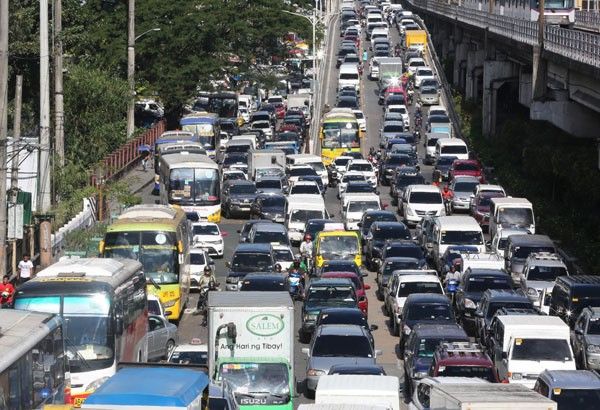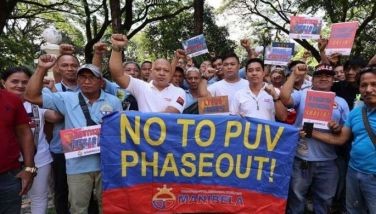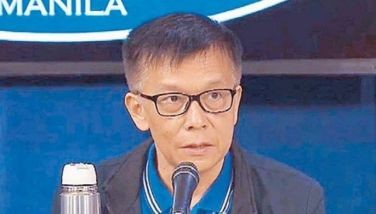Commuter-centered traffic management planning pushed

MANILA, Philippines— Sen. Francis Pangilinan recently filed a bill establishing dignified mobility as a basic human right.
Pangilinan filed Senate Bill No. 775 or An Act Providing for a Magna Carta for Dignified Commuting, Creating the National Office of Commuter Affairs in collaboration with transport advocacy group AltMobility PH.
The bill, which seeks to promote people-centered transport in the Philippines was filed days after President Rodrigo Duterte, in his fourth State of the Nation Address, ordered local chief executives to "reclaim all public roads that are being used for private ends" citing the Metro Manila traffic.
Duterte cited that the country loses P3.5 billion a day due to Metro Manila traffic.
Pangilinan cites the same figure in the bill he filed.
The cost of loss due to traffic was based on the study on Metro Manila traffic by the Japan International Cooperation Agency.
Public should be considered in traffic management planning
AltMobilityPH lamented that the worsening traffic congestion and fundamental gaps in public transport have immensely deteriorated the quality of life of countless Filipinos.
It said that traffic managers have failed to discuss the following concerns in their city planning and public transportation: Waiting time for public utility vehicles as well as streets deemed unsafe for walking or cycling as well as the smog covering the cities.
"Nakakagalit at nakakawala ng dignidad ang pagkomyut sa Pilipinas," Jedd Ugay from AltMobility PH said in a statement on the porposed magna carta.
(Commuting in the Philippines is frustrating and robs us of our dignity)
"Tila pagsabak sa giyera ang maging komyuter: ngawit at inip sa pagkahaba-habang pila sa sakayan, hapong-hapo sa usok at pakikipaghabulan sa mga bus, ubos ang oras, pera, at lakas para lang makauwi o makapasok sa trabaho," he added.
(Being a commuter is likegoing to war: You're sore and tired from the long queues, exhausted from the smoke and from chasing buses; you lose your time, money and strength just to get home or to go to work)
He cited that some roads are too narrow and have obstructions like electrical posts. He added that some roads were built without considering the needs of PWDs, of the elderly, and of pregnant women.
Ugay said the transport advocacy group wants the government "to rightfully recognize the commuting public as the primary consideration in the transport policy landscape."
"Simple lang naman ang hiling nating lahat — may pambili ka man ng sariling sasakyan o wala: may karapatan kang makauwi nang maayos, ligtas, maginhawa, maaga para makasama ang pamilya. Mangyayari lamang ito kung uunahin ang kapakanan ng karaniwang komyuter sa pagpaplano ng mga solusyong pangtrapiko," Ugay said.
(We have a simple wish— whether you can afford your own car or not:yo have the right to go home to your family safely, comfortably and early. This will only happen if you will prioritize the welfare of the public commuter in planning traffic solutions)
"We need to shift our mindsets from prioritizing vehicle speed into prioritizing the mobility needs of the people," he added.
Ugay’s concerns were also echoed by Pangilinan who said these are the reasons why they filed the proposed magna carta for dignified commuting.
"Dusa talaga ang mga kababayan nating nagco-commute, kaya minabuti nating makipag-ugnayan sa AltMobility para maisulong ang mga karapatan ng mga sumasakay ng de-padyak, tricycle, dyip, bus, tren, at kung anu-ano pang pampublikong sasakyan," Pangilinan said.
(Our commuters really suffer. That's why we are working with AltMobility to push for the rights of those who take pedicabs, tricycles, jeepneys, buses, trains, and other public transport vehicles)
"Hindi natin masusulusyunan ang isyu ng trapik kung hindi maririnig ang boses ng pinakamalaking sektor na gumagamit ng kalye," he added.
(We will not be able to solve the traffic problem if the voice of the biggest sector of road users is not heard)
Majority of commuters use public transportation
In his explanatory note on the bill, Pangilinan cited the JICA report that siad that commuters who travel using public transportation services and active transport comprise 70% of the total trips in Metro Manila, but are only given 20% of road space.
"The remaining 80% of road space are occupied by private vehicles, comprising only 30% of the total trips. PWDs and the elderly are also rarely considered in road infrastructure," the senator said.
The senator also cited the 2017 study of Boston Consulting Group which stated that Metro Manila commuters and motorists spend an average of 66 minutes stuck in traffic, making Manila's traffic the third worst in Southeast Asia.
The proposed magna carta seeks to recognize, guarantee, and enforce the right of each person, especially of commuters who rely on public transportation services and active transport in their daily lives.
Pangilinan also said that the bill aims to shift to a more sustainable transportation policy that provides safe access and mobility to all, promote economic development, preserve the environment, and ultimately uplift the lives of all commuters. — Rosette Adel
- Latest
- Trending






























